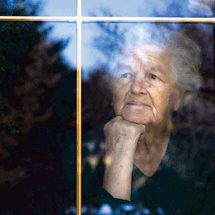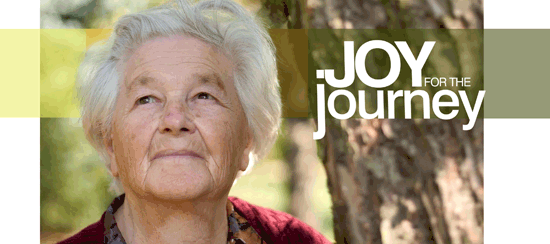|
|
 |
joy for the journey
Learning to love life after the death of a spouse.
by Lucy Hyman
|
The Bible has a lot to say about widows and gives clear directions concerning how they should be treated. It also relates the dire consequences of mistreating them. Specific widows are mentioned throughout the Bible and often used as examples of faith. One fed Elijah. Another caught the attention of Jesus when she gave her mite—all the money she possessed.
God is very concerned about widows, and they actually receive special protection from Him. Scripture instructs us to “visit widows in their affliction,” and many churches have special programs or meetings to honor their widows and widowers.
Someone has said it is harder on women than men when a spouse dies. I don’t know about that, but one thing is certain. When a spouse dies, life changes forever, and a new journey begins. As unlikely as it sounds, you can find joy on this journey.
For some, the death of a spouse is a financial nightmare. When my husband was dying, I often wondered how I would pay the bills. We barely squeaked by on two salaries. How would I exist on one?
Others endure severe loneliness, struggle with depression, or gradually turn inward, unwilling to face the [often imaginary] scrutiny of former friends and colleagues.
How can we find joy in such a bleak scenario?

Joy in the Pain
If your spouse was a Christian, you have joy knowing he or she is now in Heaven and free of pain and suffering. As my husband neared death, I sat by his bedside weeping. I said to the Lord, “You can’t take my husband! There is no way I can make it without him.”
Suddenly, as if the Lord gave me a vision, I pictured my husband well and happy, walking on streets of gold. I imagined his total awe when he came face to face with Jesus. He no longer had brain cancer, and he was so happy. In that moment, I said, “Lord, I’m willing for you to take him to Heaven where there is no more sickness and suffering.”
Later, when I called a friend in a distant city to tell her my husband had died, she didn’t say, “I’m sorry” but after a few moments of silence, she replied, “Oh what wonders he must me seeing right now!”
You can also find joy in knowing the Lord cares about you and your heartache, that He promised to heal your broken heart, and that He has promised to go with you each step of your journey.
I recently talked to a widow in her eighties who has been a widow for l4 years. She is almost blind and lives alone. I knew she had been ill, so I asked her if she was able to continue living alone. She replied with a smile, “I don’t live alone; the Lord lives with me, and I talk to Him all the time.” What a testimony.
The Bible says, “The joy of the Lord is your strength.” We can let our trials make us bitter or better. A widow friend once confessed that when she saw me with my husband at a convention she thought to herself, “Lord, how come you took my husband and she still has hers?”
Let the Joy of the Lord be your strength. Don’t question the Lord’s ways. Find joy in serving Him. The Bible relates the story of Anna. She was married for only seven years, and when her story was recorded, she was a widow in her eighties. She spent a lifetime in the temple worshipping the Lord night and day, fasting, and praying. It is obvious that she had found joy in her journey. Yet an even greater joy awaited her when the Lord allowed her to see the infant Messiah.
The Joy Breakers
Sometimes you may encounter the following hindrances to joy.
Self Pity. For a time, I didn’t think I handled my husband’s death very well, that perhaps the Lord wasn’t pleased with me. I have come to realize that there is a “time to mourn.” The Book of Ecclesiastes make that very clear. However, it also makes it clear that in time mourning must be put aside and replaced with joy.
For years after losing my husband, when someone asked how I was doing, I would burst into tears, making both of us feel miserable. One Sunday, however, as I prepared to go to church, I heard a preacher on television refer to the passage when the Lord told Joshua, “My servant Moses is dead. It’s time to stop mourning and get busy. Go ahead and cross the Jordan [my translation].” His words really spoke to me. I felt the Lord was telling me to stop feeling sorry for myself, to stop crying, and to continue my life.
Children can be another hindrance to finding joy on the journey. A widow friend fell in love and began to consider marriage. When she told her adult children, her son was furious. He asked, “Why are you doing this? When you die, where will you be buried? By our dad or by your new husband?”
The daughters also protested, insisting the man was too old for her. In light of their objections, she tried to forget about her plans. In time, however, she realized her children couldn’t live her life for her, and she refused to let them steal her joy. She remarried and found joy on her journey.

While a relationship with adult children is important, widows and widowers do not automatically surrender their ability to make decisions or live an independent life. They will be far happier if they can develop their own relationships and life outside of family.
Isolation. Many widows think that no one cares, that they are alone in their battle with grief. I was a widow for three years. On the first anniversary of my husband’s death, I was devastated when no one else remembered.
After two years, I was still sad. I reminded the Lord that He had promised to heal my broken heart. Then He brought a widower named Irvin Hyman into my life. At first I resisted. I expressed my reservations about marrying another minister to my secretary. She wisely replied, “But that’s what you know the most about—the life of a minister’s wife.” Before long, we were married, and 21 years later, we still enjoy our journey together.
If you are a recent widow or widower, or if you have been traveling life’s road alone for many years, let me encourage you. You can have joy for the journey! I pray that you will allow God to help you find it!
Adapted from a message given at a luncheon honoring widows and widowers at First FWB Church, Albany, Georgia.
About the writer: Former editor at Randall House Publications, Lucy Hyman and her husband Irvin live in Albany, GA.
|
|

